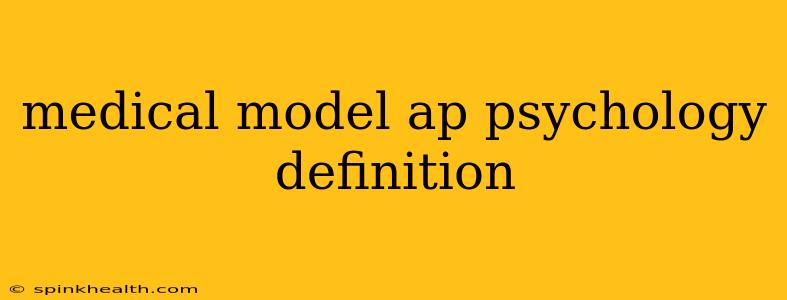The Medical Model in AP Psychology: Understanding Illness Through a Biological Lens
The story of how we understand mental illness has evolved dramatically. For centuries, explanations ranged from demonic possession to imbalances in bodily humors. But the rise of the medical model in psychology marked a significant turning point, shifting the focus from supernatural or societal explanations towards a biological understanding of mental disorders. This shift profoundly impacted how we diagnose, treat, and even perceive mental illness. Let's delve into this pivotal model and explore its implications.
The medical model, at its core, proposes that psychological disorders, like physical illnesses, have underlying biological causes, such as genetic predispositions, neurotransmitter imbalances, or brain abnormalities. Think of it as viewing the mind through the same lens we use to understand the body. If you break your leg, you seek medical attention; similarly, the medical model suggests that mental distress is a biological malfunction that needs treatment.
What are the Key Assumptions of the Medical Model?
The medical model rests on several fundamental assumptions:
- Disease as a biological problem: Mental disorders are viewed as diseases with identifiable biological causes, similar to physical illnesses like diabetes or heart disease.
- Diagnosis based on symptoms: Clinicians use standardized diagnostic criteria, such as those found in the Diagnostic and Statistical Manual of Mental Disorders (DSM), to identify and classify mental disorders based on observable symptoms.
- Treatment focused on biological interventions: Treatments often involve biological interventions such as medication (pharmacotherapy), psychosurgery, or electroconvulsive therapy (ECT). These aim to directly affect the biological mechanisms thought to be underlying the disorder.
- Emphasis on objective measures: Diagnosis relies heavily on observable behaviors and objective assessments rather than subjective interpretations or societal values.
How Does the Medical Model Influence the Treatment of Mental Illness?
The adoption of the medical model has led to revolutionary advancements in mental healthcare. Pharmacological treatments, for instance, have significantly improved the lives of many individuals experiencing severe mental illness. Antidepressants, anti-anxiety medications, and antipsychotics offer relief from debilitating symptoms, enabling many to participate more fully in life.
What are the Criticisms of the Medical Model?
Despite its significant contributions, the medical model isn't without its critics. Some argue that it:
- Oversimplifies complex issues: Reducing mental illness solely to biological factors ignores the significant influence of social, psychological, and environmental factors. A person's life experiences, relationships, and cultural context are crucial elements often overlooked.
- Can lead to stigmatization: Labeling someone as "mentally ill" can contribute to social stigma and discrimination, affecting their self-esteem, employment prospects, and overall well-being.
- May neglect the individual's experience: The focus on objective biological markers can overshadow the subjective experience of the individual struggling with a mental disorder. This can lead to a reductionist approach that diminishes the complexity of the human condition.
- Potential for over-medication: The ready availability of medication can lead to over-reliance on pharmaceutical solutions, potentially neglecting the importance of other therapeutic approaches like psychotherapy.
Are there alternative models to the medical model?
Absolutely! The biopsychosocial model, for instance, acknowledges the interplay of biological, psychological, and social factors in understanding and treating mental illness. This integrated approach provides a more holistic perspective, taking into account the individual's unique circumstances and experiences.
What is the future of the medical model in psychology?
The medical model continues to evolve. Advances in neuroscience, genetics, and brain imaging techniques are providing an increasingly nuanced understanding of the biological basis of mental disorders. However, there's a growing consensus that a truly comprehensive approach to mental health requires integration of the medical model with other perspectives that acknowledge the complex interplay of biological, psychological, and social factors. The future likely involves a more collaborative and holistic approach, ensuring that mental healthcare is both effective and humanizing.

